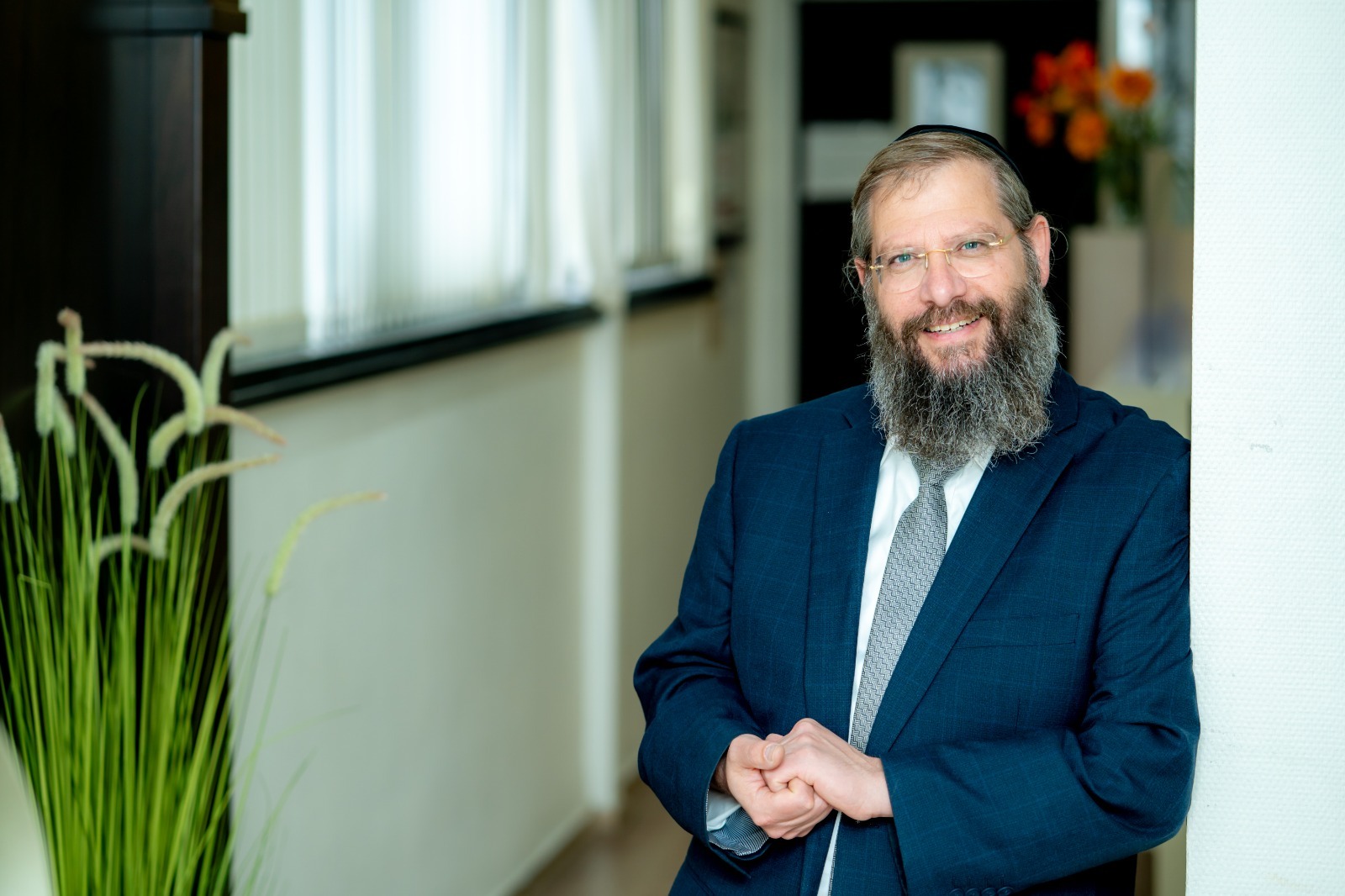"Individuals with Mental Illness Can Return to Normal Lives and Even Build Homes"
How does a young man with severe psychosis leave hospitalization and establish his home? How can a mother suffering from severe depression return to raising her children?
 In the circle: Rabbi Shmuel Munk (Photo: Hana Taib)
In the circle: Rabbi Shmuel Munk (Photo: Hana Taib)It arrives out of nowhere, like a severe car accident, and if life was previously relatively normal, suddenly nothing is as it was. Mental illness strikes and shakes everything. The teenage son passionately claims he's the Messiah, a mother to a young baby is unable to care for him due to depression, a young girl compulsively washes her hands all day, and life will never be the same. From that very moment, the individual begins a long psychological process towards acceptance of the condition. "This process usually takes many years," says Rabbi Aryeh Munk, CEO of the "Warm House" association. "The problem is, when individuals with mental illness are ready to return to normal life, they find it difficult to do so on their own. After a long period of disconnection, it’s not easy to return to work and social circles."
Living a Non-life
When Rabbi Shmuel Munk, Rabbi Aryeh's father, saw this, he couldn’t stand by. "These are invisible individuals who society often distances itself from. An unfortunate reality arises where a person with a mental disorder suffers twice. First, they have a severe illness that doesn’t let them rest. Some people would prefer physical ailments instead. Moreover, the difficulty lies in the lack of understanding from the surroundings; people distance themselves from them, and you can’t really blame them. Only those who work in mental health can understand what the individual is going through; this reality is hard to digest."
Rabbi Shmuel Munk, who deeply felt the suffering of these people, decided to take action. "About 25 years ago, the 'Warm House' association was established to aid in the rehabilitation of individuals with mental illness. Through it, they receive therapeutic support and tailored employment opportunities, along with counseling and support for their families. Slowly, they can return to a normal way of life and sometimes even build a home and raise a family."
 Rabbi Shmuel Munk (Photo: Hana Taib)
Rabbi Shmuel Munk (Photo: Hana Taib)The impossible difficulty that comes with pausing life due to mental illness led to the realization that things can be different. "From the moment such a disease strikes, the person has no life," explains Rabbi Munk. "For instance, when a girl starts washing her hands all day and cannot touch the table and chair because they seem full of germs, she can't continue going to school regularly. When a woman enters postnatal depression, the household ceases to function, her husband and children suffer, and even the beloved newborn becomes a burden. She might be at home, but there's truly no mother to give love and care. It may sound terrible, but her husband feels like a widower, and her children feel like orphans during this time. Life cannot continue like this, and if no one knows how to help, life as they know it halts. The price paid by the patient and their family is extremely high."
What About Medication?
"Medications help against the symptoms of the illness. If there's a depression issue, medication helps reduce the feeling of depression. Sadly, it usually takes time for them to impact, it’s challenging to adjust the right doses, and they have significant side effects. Moreover, despite medication and various assistance methods, individuals with mental illness often lose many years before reaching acceptance and deciding to recover. Until then, they are constantly fighting—choosing not to take medication regularly and wanting to continue 'as usual,' although their world has turned upside down."
Rising from the Ashes
Rabbi Munk explains the importance of acceptance through a parallel example. "Take someone who’s had a car accident and lost their legs. The legs were part of them since birth, facilitating movement, with no foreseeable alternative. After the accident, they feel their life halted. They’ve lost a part of their body and go through a grieving process. Initially, denial sets in—they can’t believe it’s happening to them, convincing themselves it's just a bad dream, even invoking religious teachings that Hashem creates the world anew every moment and might recreate their legs. Then comes anger—directed at the driver, at Hashem, at themselves, followed by deep sorrow and mourning for their situation. Only after this does acceptance arise, where they recognize their reality and begin pondering how to best live with it. It can take years, and from that moment, they enter a rehabilitation phase. They wear prosthetics, start walking with them, and learn to function independently. The same happens mentally—when someone loses their 'mental legs,' the process involves denial, anger, and mourning before acceptance. Then, finally, questions emerge: How do I pull myself out of bed when depression immobilizes me? How do I start returning to life with severe anxieties? It is in this space that individuals with mental illness need help—not a babysitter to preserve their illness but someone who sees them as normal people, providing crutches to start walking."
How Does the Rehabilitation Process Occur?
"The most significant aspect is occupational rehabilitation, which gives individuals the ability to re-enter the workforce. When someone goes to work, they need to dress, shower, and socially engage; most importantly, they feel useful and contributive. It's akin to resurrecting the dead. Rehabilitation levels differ: some work in a protected environment with constant support, while others can work within the community."
In addition to occupational solutions, the association operates mental health clinics. "Unfortunately, dealing with the healthcare system isn’t easy. Sometimes, the wait to see a psychiatrist extends over half a year. Consequently, people turn to private doctors. The problem is, after visiting a doctor, paying 1,500 shekels for an initial appointment, receiving medication, they need to return for follow-ups to monitor effectiveness and dosage. But they struggle with this financially, so if there's a mismatch, they stop taking the medication without returning. That’s why we set up clinic networks offering free accessible care via HMO commitments. This way, individuals can have multiple sessions with a psychiatrist or other doctors as needed. Moreover, in emotional care, it’s crucial to provide treatment within the person's cultural context. Haredi individuals, for example, need an emotional therapist from their world; otherwise, a gap forms that's hard to bridge."

“Can He Get Married?”
The family of the person dealing with mental issues also needs support. "The family of someone with mental complexities usually goes through tremendous difficulty," explains the rabbi. "The individual suffers and reflects this suffering onto them. Such a family needs support and counseling—to know how to deal with the patient and receive answers to questions stemming from their turbulent reality."
Questions from family members can sometimes be critical. "Parents whose son wishes to marry, for instance, don’t know what to do. The difficult thought that they might have to introduce another individual with a mental illness into their lives, fear of potential instability, and understanding they might have to provide solutions for future children is tough. But what does their son want? He simply desires like anyone—to love, be loved, and perhaps to have someone say Kaddish after him. Who says he's not entitled to this? When such questions reach us, decisions are unbearably challenging. Other questions arise around divorce—whether it’s time to yield to the unbearable situation and separate from a sick spouse? And the patient themselves—not only do they endure indescribable inner suffering, but now the possibility of being with their children might be taken from them too? Everyone in mental health understands you can't give snap answers. These are extremely tough issues requiring deep investigation. Often I've consulted rabbis who told me, 'We cannot decide on this; you'll have to make the decision.'"
How Do You Maintain a Stable Marriage for Individuals with Mental Illness?
"It requires great expertise, and raising children in such a situation is a separate issue. It wouldn’t be right to discuss these sensitive matters generally, as each case is unique. Generally, someone touching this subject without proper training and experience can cause irreversible harm. Mental health is one of the most complex topics requiring broad shoulders. What can be said, however, is that if someone is ready to lay the truth on the table, without hiding anything, they can achieve marriage out of joyful and loving choice. Marriages in such situations can succeed with proper guidance and mediation—of the couple and the surrounding family. But I plead again: anyone without understanding should stay away without offering even advice; sadly, we've seen families harmed by such advisors."
One rehabilitated individual, whom Rabbi Munk accompanied, is a young man who took many years to accept his illness. "It began at age 18, during the month of Elul, when he stood in the middle of the study hall, strumming on the podium and delivering an incendiary sermon," the rabbi describes. "He explained he had an Elijah revelation and that we need to strengthen ourselves because the Messiah is coming any moment. Hundreds of young men were present at the time, all witnessing the psychotic episode he experienced. The supervisor had to physically remove him from the podium, as there was no alternative. His parents were hurriedly summoned, and life, previously normal, turned into a horror movie. Suddenly, their son stood before them sometimes with wild eyes, sometimes with a vacant stare. He received strong medications that sedated him and ended up in a closed ward. The boy found himself in a completely different environment from what he knew, surrounded by severely affected individuals, wondering why he was there at all."
At that point, his parents realized they needed help. "They came to us for advice on how to deal with their son and the illness that suddenly knocked on their door. We then embarked on a 7-year challenge where this young man was not ready to accept that he was ill. He refused medication, not wanting to label himself as ill, and wasn’t ready to work in the rehabilitation center because, in his mind, he was still a yeshiva student. We talked to him repeatedly, to no avail. Only after those 7 years did he agree to accept his fate, began taking medication regularly and joined the employment framework we offered. Today he is married and living as normal a life as possible, all after extensive personal work by him and his family."
In conclusion, Rabbi Munk says, "In the past, many feared opening discussions about mental health, and some even avoided treating their loved ones due to all the concerns. Fortunately, today there is more readiness to face and deal with these issues. More people are getting treatment for mental illnesses and learning to live alongside them, and we have the privilege to assist them in returning to routine lives."

